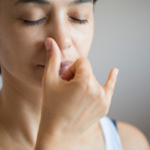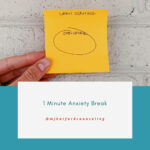Anxiety develops differently for each individual, so it’s up to you to learn more about the condition and talk to a doctor about what you’re feeling. At Sunstone Counseling, we recognize the profound effect that anxiety can have on an individual’s life, and it can be challenging to comprehend at times. Here are a few things to look for when experiencing symptoms of anxiety and what you can do to get help.
Category: Anxiety
Embracing Anxiety Could Help You Manage It
One of the most frustrating parts of navigating anxiety is that the more determined you are to control it, the worse it seems to get. As counterintuitive as it seems, trying to stamp out your anxiety could leave you stuck in that endless loop rather than offering you relief. So maybe it’s time to try something new. Maybe it’s time to unlock the door and invite your anxiety in for a chat.
5 Ways to Help Teens Cope with Anxiety
The teenage years are often met with a rollercoaster of emotions. Between hormones, school stress, and social pressures, this time can be a perfect storm for the development of mental health challenges, such as anxiety and depression. And with a new school year back in full swing, many teens may be struggling to juggle a variety of emotions, alongside their academic and extracurricular obligations. Fortunately, teens don’t have to navigate this rocky journey alone. With the help of family, friends, and therapy, teenagers can find ways to manage and cope with anxiety.
Screen Time Affects Your Mental Health. Here’s How to Cope
While screen time can be enjoyable, studies have suggested that it can take a toll on our emotions. Social media in particular, can wreak havoc with our mental health. However, it is possible to use your digital devices without your mental health suffering. Like many things in life, it’s about setting boundaries, working toward balance, and practicing moderation. Here are a few ideas to consider.
Understanding PTSD: You Are Not Alone
Post traumatic stress disorder (PTSD) is a psychiatric disorder that can originate from experiencing or witnessing any number of frightening or distressing events, such as a serious accident, a natural disaster, combat or a violent assault, or personal abuse or harassment. If you’re living with PTSD, you may feel as though you’re destined to deal with these symptoms forever. But treatment is possible, and you do not have to bear this burden alone.
3 Breathing Exercises to Help Reduce Stress and Anxiety
The body is our vessel of life, our tool for engaging with the world around us, and our protector. For many of us, anxiety takes us out of our bodies and locks us in our thoughts about the past or the future. Thankfully, when we are jolted into an anxious state, simple breathing exercises can help turn on the rest response in the body through activation of the parasympathetic nervous system and stimulation of the vagus nerve. Here are three simple breathing exercises that help reduce stress and anxiety.
Health Implications on Women Caused by Pandemic Stress
Parents have unquestionably been hit hard by the pandemic. Between school closures and virtual learning, many parents have assumed the role of teacher on top of their usual household obligations and adjusting to working from home. And on top of that, parents are helping their children navigate their fear, anxiety, and depression around COVID and tumultuous societal events.
4 Mindfulness Exercises You Can Practice Anytime, Anywhere
Mindfulness is an ancient practice that encourages us to be engaged with ourselves and the world around us without judgement. Many of us are stuck thinking about the past or worrying about the future that we don’t spend much time in the present moment at all. Getting started with a mindfulness practice doesn’t have to be complicated. Here are four brief exercises you can try at any time, in any place.
What Is Dialectical Behavioral Therapy, and Is It Good for My Teen?
Dialectical Behavioral Therapy (DBT) is broken up into four modules: mindfulness, distress tolerance, emotion regulation, and interpersonal skills. Individuals who benefit from DBT often have difficulty controlling their emotions, want to improve their impulse control, may find themselves stuck in a pattern of rocky relationships, and/or want to be more grounded in the present.
60 Second Anxiety Break
By: MJ Harford, MA Counselor in Residence Acceptance is a key skill in managing and reducing anxiety. Acceptance doesn’t have to look deep or complicated, it can be as simple as identifying what is and what isn’t within our control. The COVID19 virus has changed all of our lives; things may be more difficult and more… Read more »
The Physical Side of Anxiety in Children and Adolescents
Often, children and their caregivers do not realize anxiety can have physical effects. Children can experience various physical symptoms related to anxiety such as stomach aches, headaches, indigestion, muscle tension, nausea, fatigue, sleep disruption, and restlessness. Physical symptoms like these should always first be medically explored to rule out other underlying causes. That being said, these types of symptoms are often produced by anxiety.











